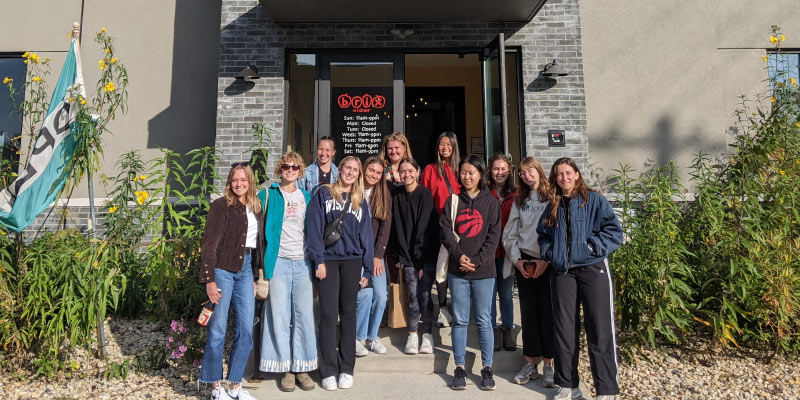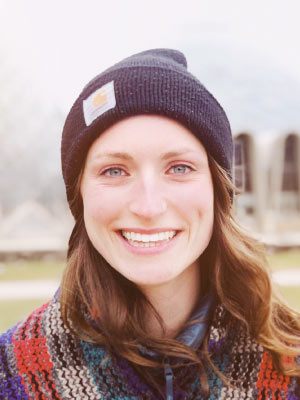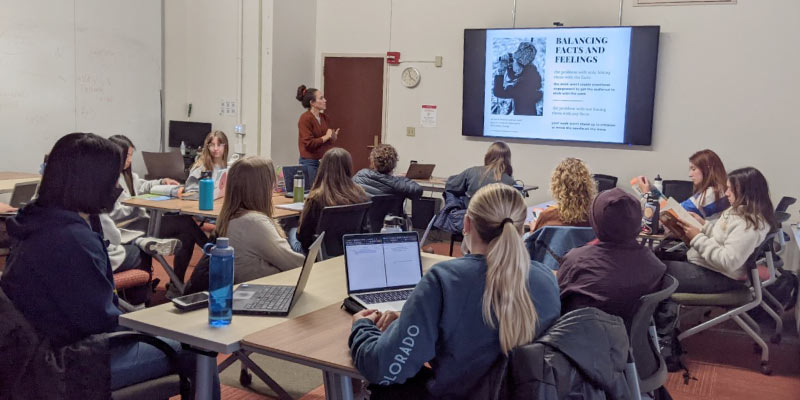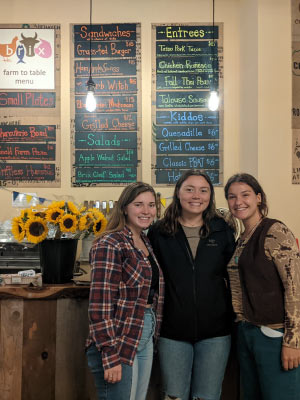
Students in Nelson Institute PhD candidate Jules Reynolds’ capstone course have had the unique opportunity to make a difference in their local community. The course — Exploring Food System Resilience in Wisconsin Communities — takes a deep dive into local food systems while working with Brix Cider, a local farm-to-table cidery and restaurant in Mount Horeb, Wisconsin. Brix Cider sources ingredients locally to create artisanal ciders and a made-from-scratch menu.
Reynolds is currently pursuing a joint doctorate degree in geography and environmental studies with research in local food systems. Her partnership with Brix originally began as a part of her research.
Reynolds was awarded a Community-Based Learning Course Development Grant through the Morgridge Center for Public Service to help enrich the student experience in her course. The grant supports the class as a community-based learning experience while exploring topics related to Wisconsin’s food systems.

“I’m so grateful for this grant because it has allowed me to extend and deepen the content of the course for the students in ways I would not have been able to otherwise,” Reynolds recalled.
The partnership and financial support from the Morgridge Center provided honoraria for guest lectures, payment to community partners for their time working with students on their capstone projects, and funding for supplies to help students create professional-grade projects to implement their work in the community.
The grant also helped fund a trip to Brix Cider for all 15 students to see the facilities and enjoy a meal with some of the staff.
“My goal when designing the course was really twofold,” Reynolds said. “First, to ground students in a theoretical understanding of local food systems and to have nuanced conversations about opportunities and challenges of them. The second goal is for students to apply that knowledge to what is actually going on in communities and how we can reach for better, more resilient, and more just food systems.”
The course splits the semester in half. The first half was spent developing an academic understanding of food systems. The class then shifts focus to working on group capstone projects that further Brix’s mission and support local food systems.
Students worked in small groups and were given the flexibility to identify project topics with Brix staff. The professional projects included deliverables for Brix and enriched understanding of the course content for the students.
Cammi Ganshert, a senior studying environmental studies and biology with an entrepreneurship certificate, discussed her group’s project: a digital timeline of the land and agriculture surrounding Brix to be embedded on their website.
“Our project tries to orient Brix into a historical time narrative of the land and agriculture history of Wisconsin and the timeline of the land,” Ganshert said. “We are trying to connect Brix with the history of the land and agriculture in an artistic way.”
The student project connecting Brix with the history of the land and agriculture aligns with a recent grant the restaurant received.
Brix Cider was awarded a local food promotion grant through the USDA in the winter of 2020, that initiated a three-year project focused on investing in community outreach, education, and developing conversations around supporting local foods and farmers.
“[Brix] asked me to be part of that partnership, where I now work with them to create outreach tools, activities, and events that invite people into the conversations with local food systems,” Reynolds said. “And now I’m taking that project and looking at it through an academic lens for my dissertation.”

Though this is Reynolds’ first semester instructing the course, she has been a teaching assistant for eight semesters in courses surrounding food systems and environmental issues.
“I love teaching and I love co-learning with my students,” Reynolds said. “I’ve found that students really enjoy thinking through food systems because it’s a really personal topic and hits close to home for them.”
Ganshert echoed her appreciation for Reynolds’ teaching style and enthusiasm for teaching students in a way that best fits the course content.
“[Reynolds] builds off of the space of knowledge she knows we already have from prior lectures or classes and transforms it into something new, interesting, and applicable.” Ganshert said. “She’s building off of our core knowledge about food systems, climate change, and disparities while illuminating Brix and showing us how that applies in a real space.”
While Reynolds does not rely heavily on a typical exam structure in her class to measure core learning, she has implemented a weekly “reflection journal” assignment that asks students to think deeply about concepts they learn about and share their thoughts and experiences with the material.
“Reflection and reflexivity are really cornerstone pieces of community-based learning,” Reynolds said. “It’s really asking students to reflect on concepts like privilege and power in relation to their community partner.”

Senior student Delaney Dykman is a journalism and environmental studies major who hopes to pursue a marketing career in the outdoor industry. “Being able to work with a local group and see an impact from our projects in class is an amazing feeling,” Dykman said, reflecting on the class structure. “I also feel so much more connected to the class and content because of our reflection journals. [The reflection journal] helps me to reflect on what I have learned and really understand why we talk about these topics.”
Reynolds said she has also felt tremendous support from the Nelson Institute throughout her program and especially through teaching this course. She is thankful for the entire Nelson Institute team, and especially for Tara Mohan’s attentiveness to her questions and inquiries. She also expressed her appreciation to the Morgridge Center for making this experience possible for her students, and to Brix for providing a great basis for her students to learn from.
“I’ve felt very supported by the Morgridge Center, not just financially but in many other ways,” she said. “And Brix has been nothing short of an amazing community partner for the students to work with. The experience, in my opinion, has truly been the highlight of my graduate career.
Reynolds said she has also felt tremendous support from the Nelson Institute throughout her program and especially through teaching this course. She is thankful for the entire Nelson Institute team, and especially for Tara Mohan’s attentiveness to her questions and inquiries.
Learn more about the Nelson Institute for Environmental Studies and how you can support our programs.